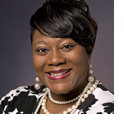
A Note from Ujima Donalson,
POD Director
In April, I attended the "We the People" dialogue hosted by Interim President Ana Mari Cauce. This event proved memorable on many fronts. It marked my first visit to wǝɫǝbʔaltxʷ – Intellectual House, the longhouse-style building that opened earlier this year and that serves as a multi-service learning and gathering space for Native American students, faculty, and staff, as well as others from various cultures and communities. I had the pleasure of meeting its director, Ross Braine, and also had the honor of serving as a table facilitator for a group of students and staff representing a wide range of ages and backgrounds. However, the most impressive part to me was Ana Mari herself. Given my own background and life experiences, I applaud her launching the UW Race and Equity Initiative, but perhaps just as compelling to me was the genuine leadership she displayed that day.
Ross Braine, who gave the opening remarks, described walking into Intellectual House as receiving a big hug, offering the sentiment of "welcome home." In truth, it felt that way to me and so was a fitting venue for what took place. The energy in the room was palpable, and all around me, people seemed receptive. Ana Mari's stories about her own experiences coupled with her insistence that "this is not someone else's problem" further engaged those in attendance and primed the pump for robust table discussions (view the speech).
Beyond the dialogue that took place that day and the launch of the Race and Equity Initiative, the lasting impression I was left with was how great an ally a person in power and authority can be, especially when they're candid and willing to admit they don't have all the answers. That, I think, is a leadership lesson we can all learn and one that is applicable to many relationships and situations.
The word "relatable" has been bandied about in regard to Hillary Clinton and her presidential chances, and many of us may be tired of hearing it already. Whether or not you agree that's an integral characteristic for a president, I do think relatability is a quality we can all hone as leaders. And that doesn't mean trying to be Average Joe. In my mind, it means being authentic, speaking our own truths, and letting ourselves be vulnerable, whether through our willingness to bring our personal selves into the workplace or through our admitting that we don't know it all.
Of course, it's not just about being willing to put yourself out there. As Ani Mari said, "because I am in a position of power…I must be self-aware and accountable." She made the point that "It's not just about bad people doing bad things. It's about us. This is not someone else's problem. And it is not someone else's responsibility to change." Therein lies another lesson leaders can learn. Nothing—in our culture, in our country, on our campus, or in our workplace—should simply be dismissed as "not my problem." It's up to us to be accountable and to take ownership.
I always view spring with such optimism—a time of hope and of forward thinking, when we can leave winter behind and when it's not too late to start anew. I'm excited to see how the Race and Equity Initiative evolves and about the subsequent opportunities that await. In the meantime, I feel galvanized to bring my full self to work, to be open, to be accountable, and to seek ways to ally with others.


